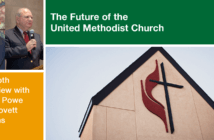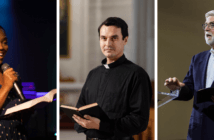Recalling the sermon Albert C. Outler preached 50 years ago at the birth of the United Methodist Church, Lovett H. Weems, Jr., says that Outler’s hope for “a church repentant in order to be a church redemptive” is vitally relevant today in the face of the divisions currently plaguing the United Methodist Church.
In recent weeks, much attention has been given to events 50 years ago in Dallas, Texas, when the United Methodist Church came into being. Many references have been made to the stirring sermon preached by Albert C. Outler just prior to the act of uniting the Methodist Church and the Evangelical United Brethren Church. The title of Outler’s sermon for this auspicious occasion was “Visions and Dreams — The Unfinished Business of an Unfinished Church.”
Outler captured the “aura of hope” of that moment. He also recognized the tensions of the day and beyond. “The church is in radical crisis, and in the throes of a profound demoralization,” he said. He noted that the mid-19th century golden age of Methodism had occurred during the heyday of pietism in a pre-urbanized society utterly different from the current context. Business as usual will not work, he warned, not knowing how much would remain “business as usual” as people decreased and money increased for the next 50 years. Much of the church was not forced to recognize the crises they were facing.
The heart of Outler’s sermon was a reminder of how the Wesleyan movement was to be truly catholic, truly evangelical, and truly reformed. His explication of these three historic formulations set a solid foundation for the new denomination. It continues to inform us today even as we stray from essentials to non-essentials — just as John Wesley feared.
Repent to Redeem
Some words near the end of Outler’s sermon seem to be particularly needed today. Of this “new chance” God is giving us with a new denomination, he hoped for “a church repentant in order to be a church redemptive.” Could repentance be our greatest need in this hour? Notice how the current divisions in our United Methodist Church rest so much on perceived innocence. Peter Schmiechen, writing about cultural wars within mainline churches, maintains that “neither version [of our divisions] can liberate because it does not know the radical repentance required of the gospel, wherein we are forced to admit that the problem is in us. Neither version can reconcile because it cannot point to a place where all people can stand. Instead each insists the other side accept unconditional surrender.”
Ephesians reminds us that God has acted decisively in Jesus Christ to reconcile Jews and Gentiles in the church, and this is a sign of the unity God seeks for the entire universe. Despite differences far beyond those of today, the “dividing wall of hostility” (2:14) disappears as all become one through Jesus Christ. The fact that the church today is not the symbol of unity to which a divided world can look for hope highlights the need for repentance that can lead to redemption. The church can, with repentance, indeed become a sign of God’s intent for the world.
John Wesley knew how to bridge differences within Christian thought and practice. Wesley’s concern was to find “third alternatives” to what Outler once called, on another occasion, “all the barren polarities generated by centuries of polemics.”
Unity in Christ
Wesleyans find our unity in Christ, despite countless differences. Such unity in Christ maintains distinctiveness and self-identity, but the differences are put in the new perspective of the common center of Jesus Christ. Unity comes through respect for others as valued children of God. Indeed, all true inclusion comes as a consequence of a shared common center. Diversity and inclusiveness flourish best not so much as ends in themselves but rather as byproducts of a faith that unites all kinds of people more tightly than any differences can separate.
Albert Outler shared this centrality of Christ to all unity until the end. He concluded his last public lecture prior to his death with these words he first learned from Herbert Butterfield, “Hold fast to Christ; and as for the rest, hang loose, while doing all you can to honor [Christ’s] name and the Christian cause!”
A Wesleyan Bond between Evangelicals and Progressives
If Outler spoke of a church that must be repentant in order to become a redemptive agent in society, so did another theologian just two years later. Following a national meeting of United Methodists seeking evangelical renewal of the church, seminary professor Claude H. Thompson wrote an article presenting his hopes for renewal. He wrote as an evangelical and as someone with high hopes for genuine Wesleyan renewal of his church. If this evangelical renewal is to become a reality, he maintained, it must surely be manifest around three issues. For Thompson, the three issues were: war, poverty, and racism. His three issues are not the only critical issues of today, but they are historic issues that have united evangelicals and progressives because they strike at the heart of the Christian and Wesleyan passions for justice.
“This is an hour when United Methodist evangelicals are called to conquest to eliminate these evils from our society,” Thompson declared. “And the same motivations which drove Francis Asbury up and down the new republic of America and John Wesley all over Great Britain, must come to possess the inheritors of that dynamic.”
As United Methodists prepare for two General Conferences in the next two years, cannot all commit to abandoning our pretenses to innocence that prevent any hope of unity? And, at the same time, cannot we unite to become God’s redemptive agent in the world to end war, poverty, and racism — and every scourge that diminishes Christ’s call upon our lives.




